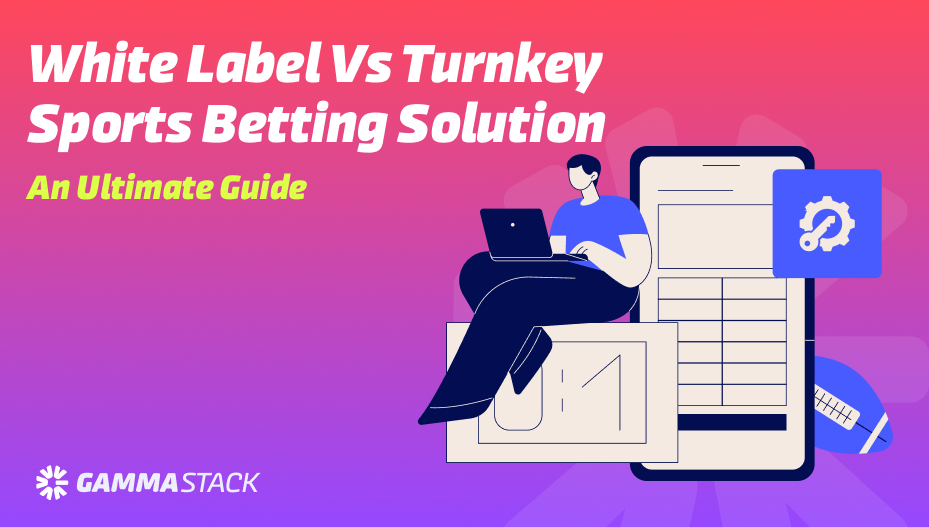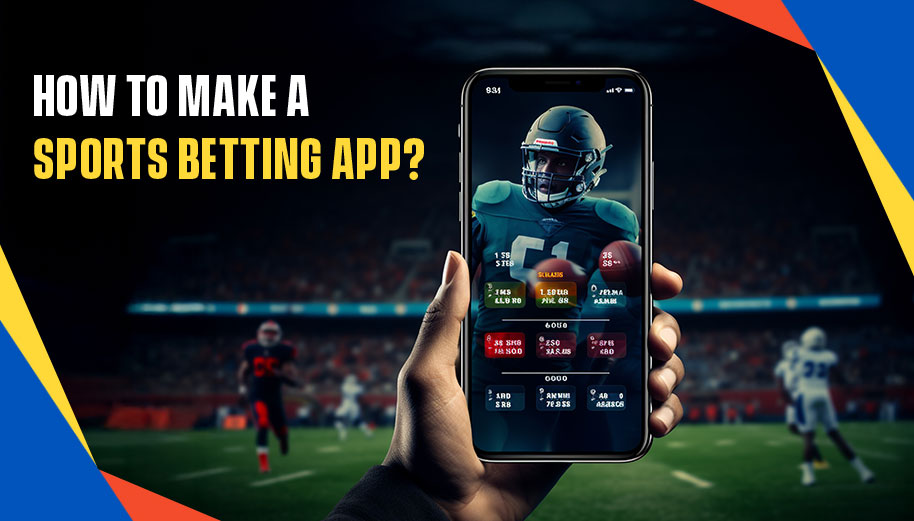
Share it
TABLE OF CONTENTS
- How Much Does it Cost to Make a Betting Software?
- Factors Influencing Betting Software Development Cost
- Types of Sports Betting Website
- How to Cut Cost to Develop a Sports Betting Software
- Get the Best Quote on Sports Betting Software Development from GammaStack
- Frequently Asked Questions (FAQs) on Sports Betting Software Price
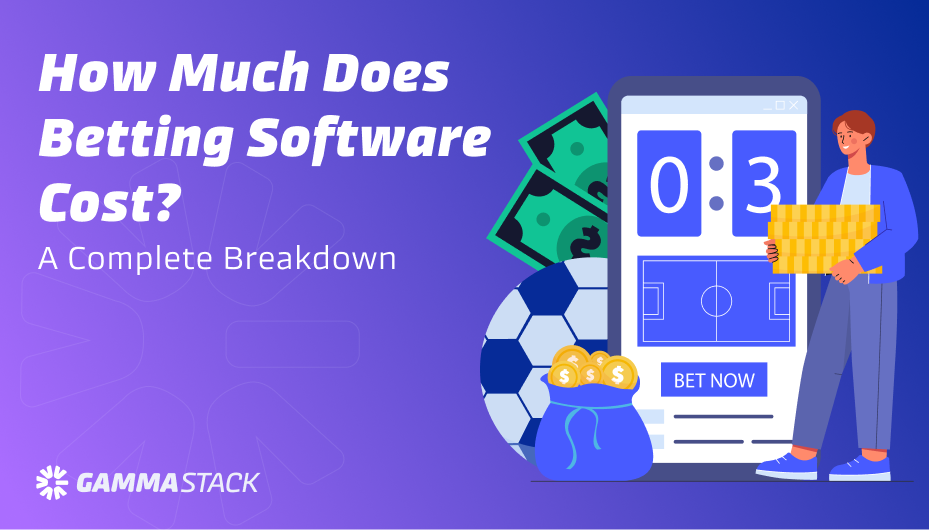
How Much Does Betting Software Cost? A Complete Breakdown
Launching a betting business is thrilling, but understanding the true cost is crucial. It is much like purchasing a car. You get a simple model, or you go for one with a lot of features. The betting software development cost varies depending on how much you want. Some businesses need only straightforward betting features. Others need live betting, multilinguality, and tailored features. These features increase the price. In this guide, we will outline the pricing simply. You will get to understand how the overall cost gets influenced as well as how to plan your budget. Let’s guide you through a smart choice for your betting software investment.
Let’s head straight!
How Much Does it Cost to Make a Betting Software?
Let’s take a look at the comprehensive table mentioning approximate costs to develop a sports betting software. Note that these are approximate values and can vary from one sports betting software provider to another. Also, several other factors influence the sports betting software price models that we’ll discuss in a while.
Cost Area
Details
Best For

Software Development
Software development covers writing and testing the code that powers your sportsbook. This cost varies based on whether you pick a ready‑made solution or a custom build. It includes backend work, user interfaces, and platform features. One‑time fees range from $5,000 to $100,000. The final price depends on features, complexity, and the vendor you choose.

Licensing Fees
Licensing Fees cover the legal right to run a betting business in your state. You pay regulators for a gaming license. These fees vary by location and risk level. Licensing costs range from $50,000 in less-regulated markets to over $1 million annually in U.S. states or major European jurisdictions, depending on compliance demands and market access. Higher fees often mean stricter checks and more market access. Budget for renewals and compliance audits too.

Platform Hosting
Platform hosting pays for the servers and cloud services your sportsbook runs on. This cost covers computing power, data storage, and network traffic. Fees range from $8,000 to $20,000 per month in the U.S. You scale up or down based on user numbers. Good hosting ensures fast load times and reliable service under high demand.

Design & UI/UX
Design & UI/UX covers the look and feel of your web and mobile apps. Designers create layouts, buttons, and menus for easy navigation. This work makes your platform user‑friendly and attractive. One‑time costs in the U.S. range from $3,000 to $12,000. Better design can boost user satisfaction and lower drop‑off during signup or bet placement.

Third‑Party Integration
Third‑party integration links your sportsbook to external services. You connect to odds feeds, payment gateways, and KYC tools. This work lets you offer real odds, fast deposits, and secure user checks. Monthly fees range from $1,000 to $50,000 in the U.S. The total depends on how many partners you need and the data volume you handle.

Live Betting Features
Live betting features add in‑play wagering to your platform. This includes real‑time odds engines, data feeds, and bet settlement tools. You can let users place bets during events. U.S. one‑time costs range from $15,000 to $30,000. Adding live betting draws more players and boosts engagement. It also needs fast data and low latency.

Security & Compliance
Security and compliance ensures your sportsbook is safe and legal. You add encryption, anti‑fraud systems, and fair‑play checks. Audits and tests protect user data and meet rules. Initial setup costs for security and compliance can range from $50,000 to $200,000 in regulated markets, including encryption systems, anti-fraud tools, and third-party audits. Ongoing costs for monitoring, updates, and legal compliance should also be budgeted. Proper security builds trust and avoids fines. You must always update systems as rules change.

Marketing & Branding
Marketing and branding covers how you attract and keep players. This includes your logo, ads, SEO, and affiliate deals. You also run social media and email campaigns. Top-tier U.S. operators may spend $50 million or more annually, but most mid-sized or new platforms typically spend $100,000 to $5 million per year, depending on market and strategy. Good marketing drives traffic and bets. You adjust ads to find what works best.

Maintenance & Updates
Maintenance and updates keep your sportsbook running smoothly. You fix bugs, add small features, and update security. You also offer user support and server checks. Monthly costs in the U.S. range from $5,000 to $20,000. Regular work avoids downtime. It keeps players happy and your site safe from new threats.

Staff & Management Tools
Admin panel and reports are a crucial part of staff and management tools. You can add or remove users and check bets. The system tracks performance. You set roles and permissions. One‑time U.S. costs range from $2,000 to $8,000. Good tools save time. They help your team work faster and make better decisions.

Mobile App Development
Mobile app development builds native iOS and Android apps. You need designers, developers, and testers. The work covers UX, coding, and app store approval. U.S. one‑time costs range from $50,000 to $300,000. Good apps give fast bet placement and alerts. They help you reach more players on mobile devices today.
Factors Influencing Betting Software Development Cost
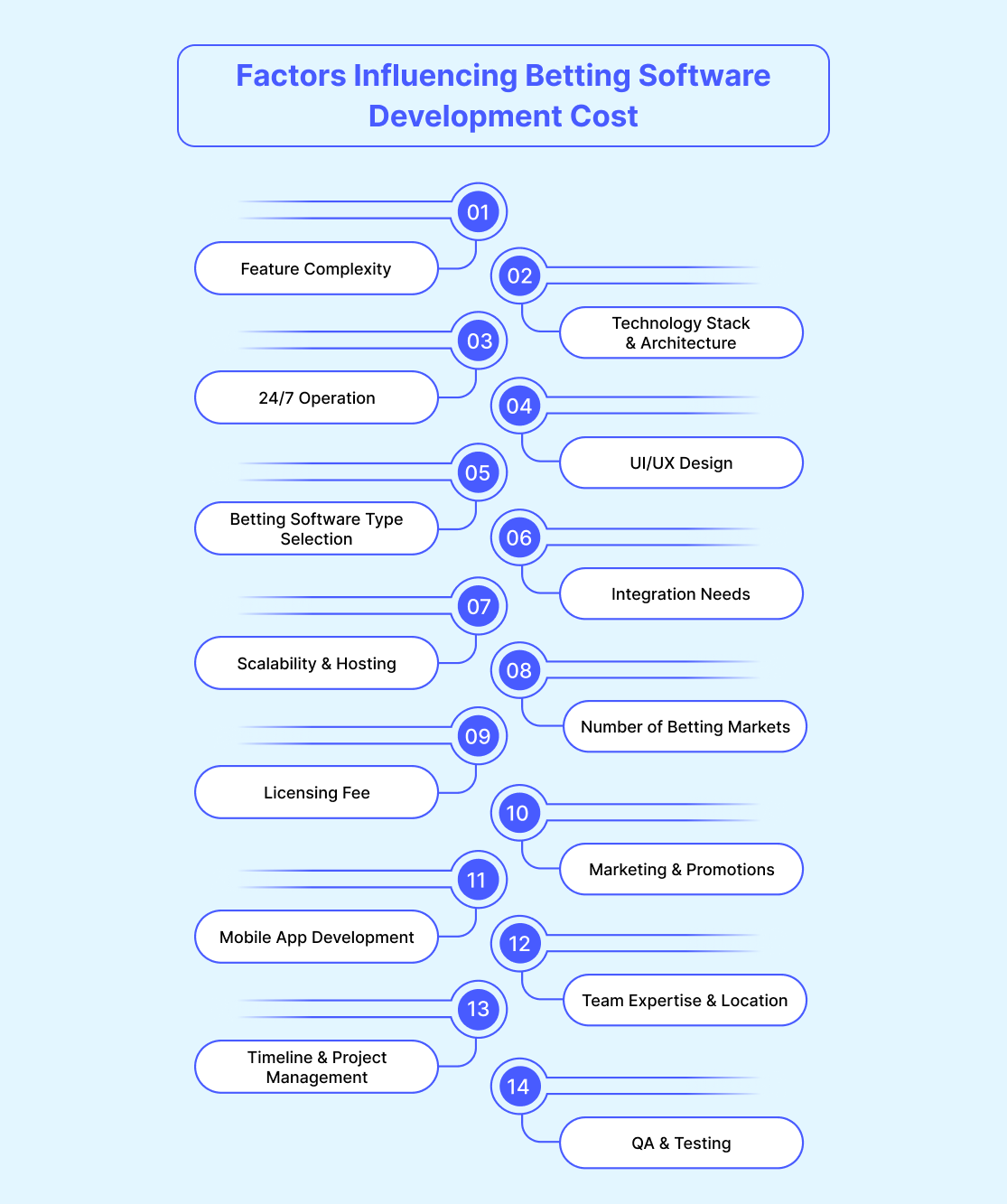

Feature Complexity
The more features you add, the higher the cost. Basic betting options are cheaper, while live betting and in-play updates are more expensive. Other features that add complexity and increase cost include multi-currency, multi-language, and custom rules.

Technology Stack & Architecture
The choice of technology and structure affects cost. Modern frameworks require skilled developers and using microservices or cloud tools adds to the setup cost. Legacy tech is cheaper but slower. A clear plan and good architecture reduce downtime and bugs, saving money in the long run.

UI/UX Design
Good design is key for ease of use but it costs time and money. Simpler layouts are faster and cheaper but you risk losing appeal. Balancing looks and speed helps control costs and keep users happy.

Betting Software Type Selection
You can pick white‑label, turnkey, or fully custom software. White‑label is quick and cheaper but limits your branding. Turnkey solutions offer basic custom options at a mid‑range cost. Fully custom builds from scratch, giving full control but costing more. Your choice affects development time and price. Match the type to your needs, timeline, and budget.

Integration Needs
You will connect your platform to payment gateways, odds feeds, blockchain networks, and KYC tools. Each link needs code, tests, and security checks. Some APIs are free. Others charge fees per call. Crypto integration adds wallet setup and network nodes. Payment setup requires PCI compliance. More links take more time and risk. This raises your integration cost.

Security & Compliance
Player data security requires encryption, firewalls, backups, and compliance with regional legal standards. Anti-fraud tools and security testing are also essential to avoid fines or hacks. Early investment in security saves money in the long run.

Scalability & Hosting
Your betting website must handle many users at once. You need servers or cloud plans. High‑traffic peaks need more power. This raises your hosting bill. Auto‑scaling can help control cost. You pay for what you use. A basic plan is cheap but less reliable. A strong setup costs more but keeps your service live at all times.

Number of Betting Markets
The range of sports and events you offer impacts cost. Covering only major leagues costs less. Adding niche sports, eSports, and special events needs extra data feeds and rules. Each market requires its own odds system and updates. More markets mean more code, tests, and management. Choose markets your audience wants. This sets your budget for market coverage.

Licensing Fee
You need a legal license to run a betting platform. Fees vary by state or region. Some states charge $50,000 per year. Others can cost over $1 million. You may pay for renewals, audits, and background checks. The process takes time and admin support. Budget early to cover these fees. This keeps you compliant and avoids fines.

Marketing & Promotions
You must attract players to grow your platform. Marketing costs include ads, SEO, social media, and affiliate programs. A new operator may spend $50,000 to $200,000 yearly. Promotions like free bets or bonuses add to cost. You also need tracking tools and staff to run campaigns. Ongoing spending is needed to stay visible. Plan a steady marketing budget.

Mobile App Development
Building native apps for iOS and Android adds time and cost. You may choose cross‑platform tools. They save some work. But native code often runs faster. Each app needs its own design and tests. App store reviews can add delays. Push notifications and offline mode use more code. Plan for both versions to set a clear budget.

Team Expertise & Location
Team size, seniority, and location affect cost. Senior local developers are most expensive; junior offshore developers are least. Large teams are fast but costly. Outsourcing is cheap but needs coordination. Balance expertise, cost, and communication.

Timeline & Project Management
Tight deadlines increase costs due to potential overtime and errors. Planning, clear goals, and Agile methods help. A realistic timeline and clear milestones are key to managing the budget.

QA & Testing
Testing is crucial for identifying bugs early. While manual testing is time-consuming, automated testing requires initial setup. Comprehensive testing covers security, load, and user experience, and necessitates test data and environments. A robust QA process minimizes post-launch bug fixes, saving time and money.
EXPLORE MORE BLOGS FROM VARIOUS CATEGORIES
Types of Sports Betting Website
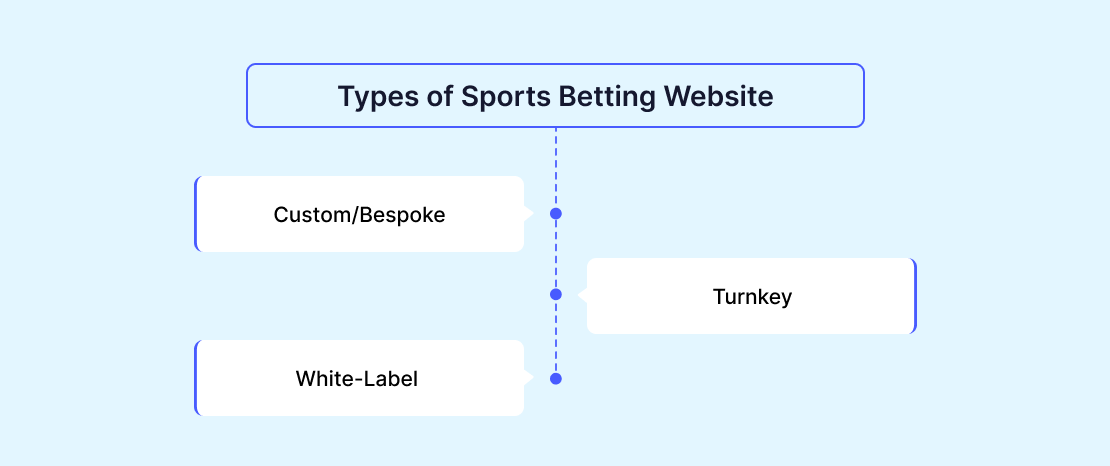

Custom/Bespoke
Custom or bespoke software is built from scratch for your needs. It offers unique features and control. Best for operators needing full control and unique features.
The most common types of advertisements:
Pros
- Flexible
- Scalable
Cons
- High cost
- Long build time

Turnkey
Turnkey software is a ready‑made platform you own. It offers core features and fast delivery. Best for operators wanting fast launch on moderate budgets.
Pros
- Fast setup
- Lower upfront cost
Cons
- Limited customization
- Ongoing costs

White-Label
White‑label lets you rebrand an existing platform. They include hosting and support. Best for new entrants wanting a fast brand launch.
Pros
- No development
- Built‑in support
Cons
- Shared branding
- Less control
How to Cut Cost to Develop a Sports Betting Software
Building sports betting software can be expensive. But with smart planning, you can save money without losing quality. The first step is to choose between custom and ready-made software. This will provide a fair idea of betting software price at the initial stage. Ready-made platforms such as turnkey and white-label betting software are cheaper and quicker to launch. If you have a limited budget, then this is a great option to start with.
Next, focus only on the must-have features in the first version. You can always add more later. This helps reduce both time and cost.
Avoid building everything from scratch. Instead, use third-party services for things like payment gateways, KYC, and odds feeds. These are already tested and save you from extra development work. You can also reduce the hosting costs by using shared or cloud-based services.
Don’t forget to pre-plan your project well. Clear timelines and a defined scope prevent delays and extra expenses. Also, regular testing during development helps catch issues early before they become costly.
You should not cut costs on important things like security, licenses, and compliance. These are vital for smooth operations and user trust.
Essential features where cost-cutting is not suggested
- Real-time betting updates
- Payment gateway integration
- User data security
- KYC/AML verification
- Betting odds management
- Mobile responsiveness
- Admin dashboard
- Licensing and regulatory tools
By making smart choices, you can keep your budget in check. It also enables you to still launch a powerful, reliable sportsbook platform.
Want To Get The Exact Pricing Models?
Get the Best Quote on Sports Betting Software Development from GammaStack
Looking for the best cost to develop a sports betting software? GammaStack is here to help. We offer clear pricing with no hidden fees. Our team works with you to understand your needs and gives you a fair quote. Whether you want basic features or a full custom solution, we’ve got you covered. With 14+ years in the industry and 80+ successful betting projects, we know how to deliver quality. From live betting to secure payments, our software has it all. Contact us today and get your personalized quote. Let GammaStack help you build a strong and successful betting business.
Frequently Asked Questions (FAQs) on Sports Betting Software Price
GammaStack is the best sports betting software development company. We offer the best competitive software and price quotes. With customizations and ready-to-launch software, you can launch your sports betting business hassle-free.
The sports betting software development cost in the U.S. varies based on features and complexity:
- Basic Software: Approximately $12,000 to $18,000
- Medium Complexity: Around $20,000 to $35,000
- Advanced Features: Up to $45,000 or more
These estimates can increase with extra features like live streaming, AI integration, or multi-platform support. Always consult with a development team to get a precise quote tailored to your needs.
Some operators report ROI in the range of 25% to 35% annually, but this depends heavily on customer acquisition cost, retention, and market maturity. This means if you invest $10,000, you could earn $2,500 to $3,500 in profit. Strong marketing and good user experience can help increase this return. The ROI of a sports betting software company depends on many factors. Accurate ROI calculations need expert financial advice or a detailed market study.
Sportsbook websites generate their profits by adding a small fee to every bet, known as the "vig" or fee. This fee guarantees that they make money irrespective of the outcome of the game. Transaction fees, premium services, and advertisements also contribute to their earnings. These practices keep their company efficiently operational.
